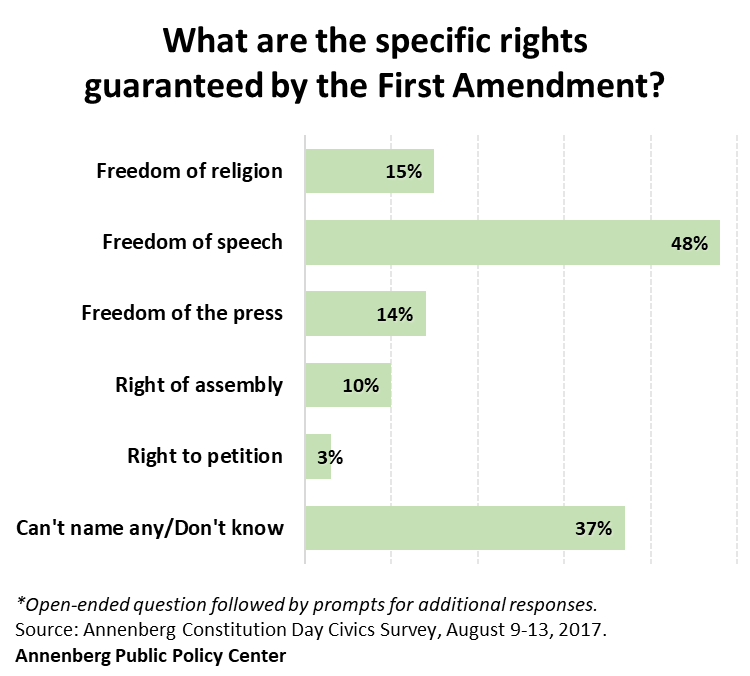The US Constitution was adopted 230 years ago, on September 17, 1787. Its words are as vital today as when the founders agrees that the Constitution would be sent to the Confederation Congress to start the ratification process with the states. It words are invoked daily in controversies over free speech, gun rights, religious expression, the separation of powers, states’ rights, due process of law and the exercise of individual liberties.
Yet, as we mark Constitution Day in accordance with 36 U.S.C. § 106 (2012) (this year, the day is observed on Monday, September 18th), Americans have an uncertain understanding of what the document says, per a recent poll by the Annenberg Public Policy Center of the University of Pennsylvania. The annual Annenberg Constitution Day Civics Survey finds that:
- More than half of Americans (53 percent) incorrectly think it is accurate to say that immigrants who are here illegally do not have any rights under the U.S. Constitution;
- More than a third of those surveyed (37 percent) can’t name any of the rights guaranteed under the First Amendment;
- Only a quarter of Americans (26 percent) can name all three branches of government.



Why should this matter? it is difficult to safeguard constitutional rights without understanding what they are. The continued vitality of our democracy is dependent upon an informed citizenry. Understanding the history of the Constitution and its amendments will assist all of us in more fully appreciating these rights and responsibilities as they have evolved over time. Moreover, such understanding will ensure that these rights will continue to be exercised, valued, and cherished by future generations.
The founders wanted to make certain that the federal government was limited in powers to those specifically enumerated in the constitution. How have we moved from these very clear and quite limited roles of the government? We see Presidents “passing laws” in a de facto fashion and refusing to enforce laws duly passed by Congress although sworn to do so. The Supreme Court has ruled on healthcare, education, abortion, and marriage. These powers are not enumerated the Constitution and are arguably reserved for the states. Why are we not concerned? The Founders, on this day, 230 years ago, signed a document making certain that our freedoms would not be taken away, but they did not anticipate that they might be given away. Happy Constitution Day. Celebrate it and protect it.
 For more on the topic, see the Brooklyn Law School Library’s copy of The Blessings of Liberty: A Concise History of the Constitution of the United States by Michael Les Benedict (Call No. KF4541 .B443 2017). The text provides students with a history of American constitutional development in the context of political, economic, and social change. The author stresses the role that the American people have played over time in defining the powers of government and the rights of individuals and minorities. He covers important trends and events in US constitutional history, encompassing key Supreme Court and lower-court cases. The third edition is updated to include the election of 2000, the Tea Party and the rise of popular constitutionalism, and the rise of judicial supremacy as seen in cases such as Citizens United, the Affordable Care Act, and gay marriage.
For more on the topic, see the Brooklyn Law School Library’s copy of The Blessings of Liberty: A Concise History of the Constitution of the United States by Michael Les Benedict (Call No. KF4541 .B443 2017). The text provides students with a history of American constitutional development in the context of political, economic, and social change. The author stresses the role that the American people have played over time in defining the powers of government and the rights of individuals and minorities. He covers important trends and events in US constitutional history, encompassing key Supreme Court and lower-court cases. The third edition is updated to include the election of 2000, the Tea Party and the rise of popular constitutionalism, and the rise of judicial supremacy as seen in cases such as Citizens United, the Affordable Care Act, and gay marriage.
